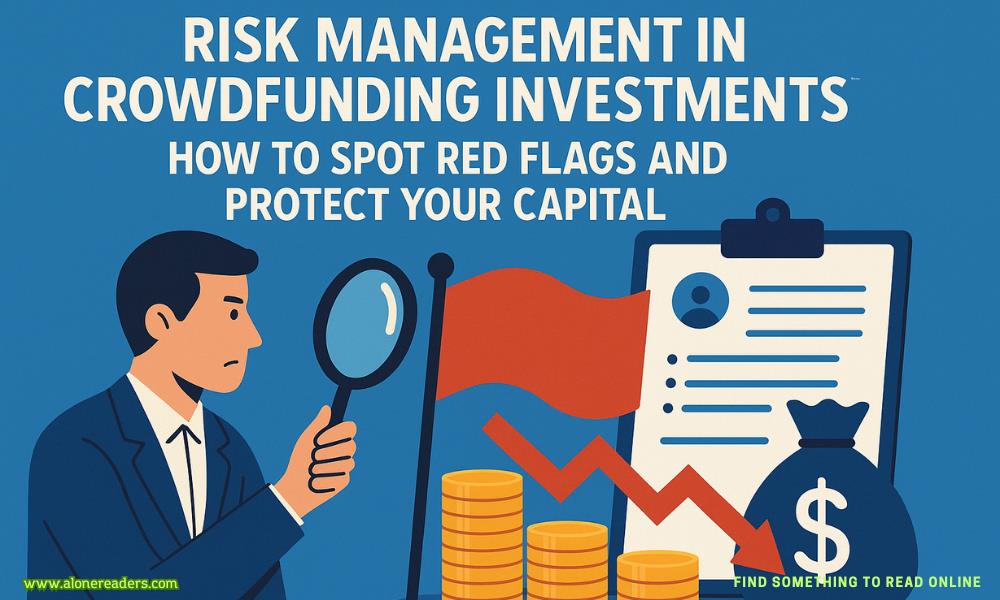
Crowdfunding has transformed the startup landscape, allowing ordinary investors to support early-stage companies with the hope of high returns. However, with high potential reward comes substantial risk. Unlike publicly traded stocks, most crowdfunding opportunities lack liquidity, transparency, and robust regulation. Therefore, managing risk becomes crucial for any investor entering this space. This guide explores specific methods to assess startup viability, detect scam signals, evaluate founders critically, and apply practical diversification strategies.
Illiquidity Risk
Most crowdfunding investments are not traded on public markets. Once you invest, your money is locked in for years, often without any clear path to exit until an acquisition or IPO occurs—if it ever does.
Information Asymmetry
Startups are not required to disclose detailed financials or performance metrics. Investors usually rely on pitch decks, videos, and founder promises—materials that are often polished but lacking in substantive validation.
Startup Failure Rates
According to industry statistics, over 90% of startups fail. Even those that survive often pivot away from the original business model or raise funds in ways that dilute early investors’ equity.
Identifying problematic campaigns early is essential. Here are some red flags to watch closely:
Unrealistic Financial Projections
If a pre-revenue startup forecasts $50 million in revenue within two years, that's not ambition—that’s delusion. Good startups provide conservative estimates backed by data and industry benchmarks.
Vague or Incomplete Business Models
A legitimate startup clearly articulates how it will make money, who the customers are, and what the competitive advantage is. If a campaign relies on buzzwords like “AI-powered” or “blockchain-enabled” without clear use cases or monetization plans, proceed with caution.
Overemphasis on Vision, Little Execution
Startups that focus more on the “big idea” rather than milestones already achieved—like early customer traction, prototype development, or signed partnerships—may lack substance.
Absence of External Validation
Legitimate startups often list advisors, institutional investors, or incubators backing the project. Lack of any such third-party validation increases the risk of fraud or incompetence.
Unprofessional Campaign Materials
Poorly written content, low-quality videos, or unclear financial tables may indicate lack of seriousness or an attempt to deceive less sophisticated investors.
Check Founders’ Track Record
A founder with previous startup experience—whether the venture succeeded or failed—is generally more reliable than a first-timer with no operational history. Use platforms like LinkedIn to verify employment history, degrees, and past ventures.
Beware of Founders with Inflated Titles or Claims
If a founder claims to have “built a company from zero to $10M” but leaves out the name or time frame, this is a signal to dig deeper. Ask for specifics or look for evidence in media coverage or company press releases.
Look for Complementary Skill Sets in the Team
A solid founding team isn’t composed of just visionaries—it needs a balance of technical, operational, and marketing expertise. A team of only MBAs or only engineers might lack the balance necessary to execute and scale.
Gauge Transparency and Responsiveness
Many crowdfunding platforms allow investors to ask public questions. Note how the founders respond. If they dodge, delay, or get defensive, consider it a major red flag.
Avoid Charismatic Manipulators
Overly slick founders who focus more on storytelling than operations or who push FOMO (fear of missing out) tactics may be masking lack of business fundamentals.
Ask for the Cap Table
Understanding the current capitalization table reveals how ownership is distributed. Excessive early-stage dilution or overly generous founder equity grants can signal poor planning or risk for future investor returns.
Check for Legal Filings and IP Ownership
Look up business registration records. Does the company exist legally? Is the founder listed? Do they own the domain and intellectual property, or is it held under another company?
Google the Startup + “Scam” or “Complaint”
You’d be surprised how often concerns are aired on forums, social media, or blog posts. Run these quick searches to surface any patterns of questionable behavior.
Understand the Use of Funds
A trustworthy startup breaks down how the capital raised will be used—product development, hiring, marketing, etc. Be cautious if 50%+ is allocated to “operational expenses” with no breakdown.
Crowdfunding investments are inherently risky. Diversification is your primary tool to manage that risk and avoid total portfolio decimation.
The 5–10% Rule
Allocate only 5% to 10% of your total investment capital to high-risk startups. This ensures that even if all crowdfunding ventures fail, your overall financial well-being remains intact.
Spread Across Different Industries
Don't invest in five consumer tech startups. Spread your bets across health tech, B2B SaaS, clean energy, etc. Each industry has unique growth patterns and risk factors.
Invest Across Multiple Stages
Some platforms offer both early-seed and growth-stage opportunities. Diversify across stages—early startups have higher returns but greater risk, while later-stage companies offer better validation and lower risk.
Use Multiple Platforms
Different platforms have different vetting standards. Using more than one reduces your exposure to platform-specific blind spots.
Track and Reassess Annually
Create a basic spreadsheet to track your investments, company progress, updates from founders, and any follow-on funding rounds. Reassess every 12 months and be ready to write off underperformers.
Avoid Herd Mentality
Just because a campaign is “trending” doesn’t mean it’s good. Popularity can be engineered through PR stunts or coordinated investment from insiders.
Be Wary of Emotional Triggers
Startups often tell emotional stories to win over retail investors—about saving the planet, helping the disabled, or revolutionizing education. While causes matter, always separate emotion from fundamentals.
FOMO Is Not a Strategy
Scarcity tactics like “Only 24 hours left!” or “87% funded!” are marketing tools. Make decisions based on analysis, not urgency.
Final Thoughts: Risk Management is a Discipline, Not an Afterthought
Investing in crowdfunding startups can be exciting and financially rewarding—but only if approached with the same rigor you’d apply to public market investing. Avoid falling into the trap of investing based on enthusiasm, charisma, or buzzwords. Instead, focus on fundamentals, transparency, and a robust vetting process. Combine that with smart diversification, and you’ll maximize your odds of avoiding catastrophic loss and perhaps even backing the next big thing.